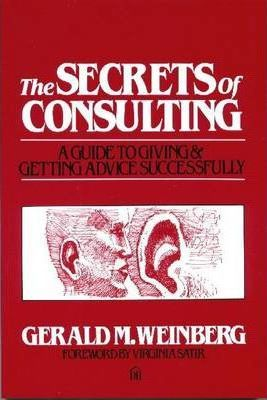Consulting

The first book I bought when I became a consultant was “The Secrets of Consulting” by Gerald M. Weinberg. The book offers some nice lessons for consultants. Below are some of my favourites.
Convincing executives depends on trust
People might have fantasies about being a consultant and traveling to exotic places, giving brilliant advice, and making large fees with minimal work. Consulting is not as simple as it appears though. For example, it’s very difficult to convince executives of the value of consulting services. Trust plays a role here: Weinberg once learned that he was awarded the consulting contract because he was the only one who did not promise to solve all the firm's problems.
Clients buy alibis, not solutions
Clients are not buying solutions but instead buying alibis to give to their management. Also, solving one problem often leads to another problem appearing in its place. This might seem a cash cow, but a consultant may become less adaptable to future conditions as they become more adapted to the current situation in the organization.
The Law of Raspberry Jam
As a consultant, one could make more money by reaching a wider audience, but the message would become diluted. This is The Law of Raspberry Jam: the wider you spread a message, the thinner it gets. So, there is a choice between influence (quality) or affluence (quantity).
The Lone Ranger Fantasy
Weinberg wrote that anything can be achieved as long as it is not important who gets the credit. Wanting to take credit for your work – Weinberg called this The Lone Ranger Fantasy - can seriously interfere with your performance.
Reasonableness trumps rationality
Consulting work often involves paradoxes, contradictions, and dilemmas. These paradoxes arise because consultants deal in change, and most people only need a consultant when logic isn't working and they are stuck in a paradox. Therefore, reasonableness is more important than rationality: Many important things can only be explained through jokes, riddles, and paradoxes. It's important to be able to laugh things off and start over.
Dealing with “optimitis”
Optimitis is an unhealthy, unrealistic agreement to solving a problem in the best, fastest or cheapest way. It can be found in anyone who is asked to produce solutions to problems. Weinberg called it “an inflammation of the optimization nerve”, that part of the nervous system which responds to such requests as “Give us the minimum cost solution”; “Get it done in the shortest possible time”; or “We must do it in the best possible way”. Weinberg suggests curing optimitis by asking: “What are you willing to sacrifice?”. Creating a tradeoff chart that illustrates the relationship between different parameters helps to understand the costs associated with moving in one direction, and those costs must be balanced with the benefits. Tradeoffs are often of the form now versus later, balancing certainty now with uncertainty in the future.
The omniscient consultant is a myth
Consultants often find themselves out of their depth when they are called in to solve problems. Even specialists can be stumped by problems that are not within their area of expertise. Every profession has its secrets, e.g. the secret of medicine that 90% of all illness cures itself; the body is effective even when we don't know what we're doing. This also goes for consultants. Therefore, it’s advisable for the consultant to switch to a different approach if what you've been doing hasn't solved the problem.
Dealing with Pandora’s Pox
When concerned about your inability to prevent system failures, despite your knowledge and expertise, it’s wise to consider that change is inevitable. Crises may seem like a crisis, but it's just the end of an illusion. The key is to learn how to make changes safely and effectively. Considering the safety market, Weinberg would have some useful advice: Marketeers will continue to approach clients, and it is likely that they will succumb to some of their persuasion. Weinberg coins the term Pandora's Pox, a prevalent social disease spread by marketeers. Like other social diseases, it is endemic and no breakthrough technology is likely to eradicate it. As a consultant, you can guide your clients in protecting themselves by helping them establish a series of defenses when considering new deals. The first defense is accepting that the new system will likely fail in some ways. The second defense is to spend 30 seconds considering how the better way of using the system could fail. By doing this, you can identify a few significant failures that could otherwise go unnoticed. The third defense is to invent a backup system. For example, if you are using a new alarm clock, you could provide a backup alarm or ask someone to assist in responding to the alarm in case of failure. This not only protects you against multiple failure scenarios but also provides a backup in case of unfamiliarity with the new system. Even backup systems can fail. To prevent this, it is essential to have multiple backup systems in place. Improvement is preferable to perfection!
Gerald M. Weinberg (1933-2018) was a computer scientist, systems thinker, and a professor of psychology and anthropology. His book “The Secrets of Consulting: A Guide to Giving and Getting Advice Successfully” was published by Dorset House of New York in 1985.